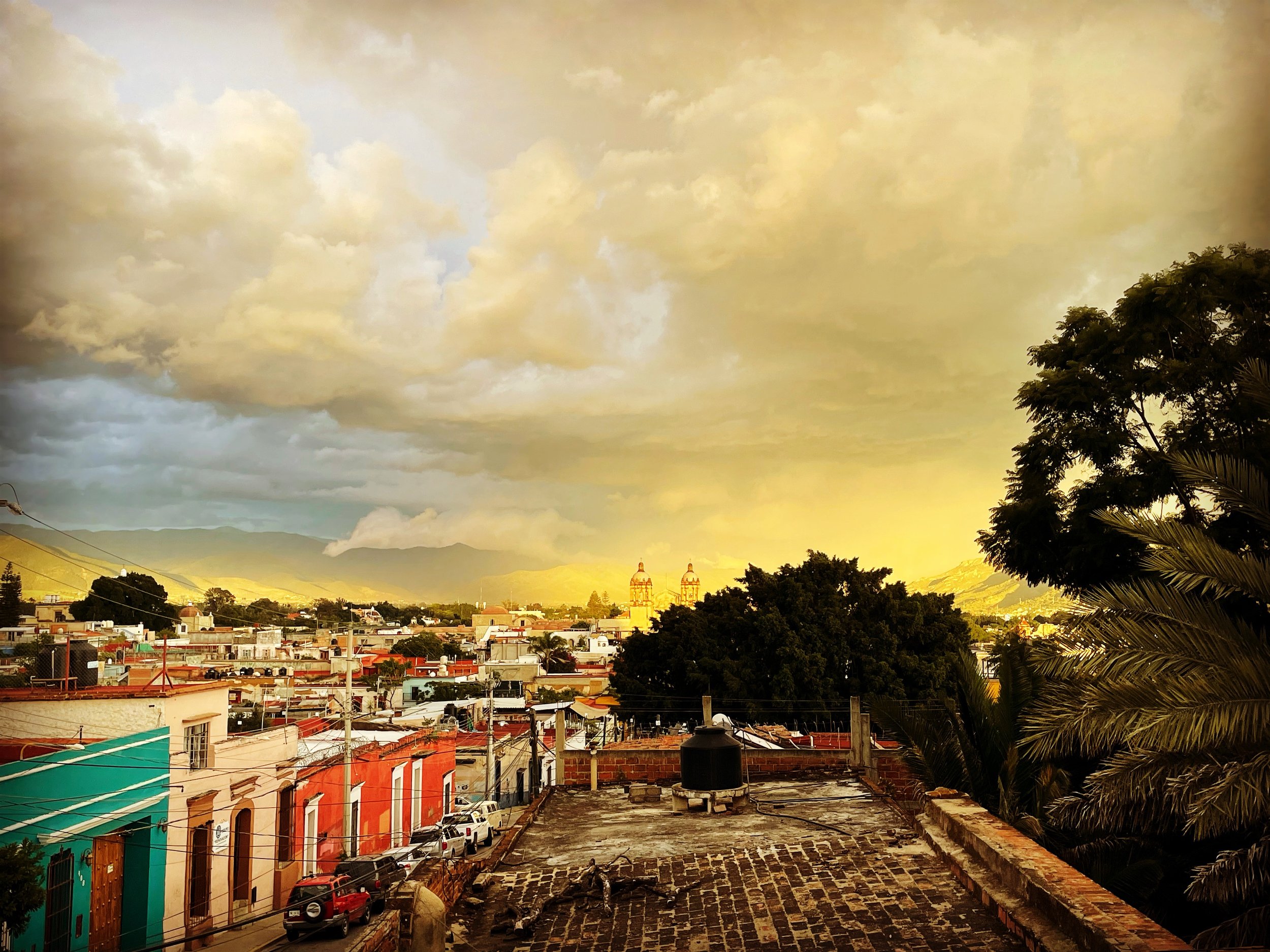Residency Reflections
Sunset from the roof of Poco a Poco
Big confession: the Poco a Poco residency is the first "official" residency I've ever done. For years, I've been wanting to do a residency but it's never felt attainable to me because I couldn't picture myself as a "Serious Artist" (i.e., someone who makes a living off of art). And, in my mind, only "Serious Artists" were accepted to residencies. I've had a creative practice for years, where I make things in the in-between spaces of my life. But only in the past three or four years have I been approaching it with more commitment. I love the "flow" that comes with painting and drawing, but it also became urgent to me to use my creative practice to speak about social and political issues.
In 2019, I visited Oaxaca on a vacation and found out about Poco a Poco through their now defunct gallery space. Their residency program really spoke to me because it felt more inclusive of how people approach creativity. It still felt a little intimidating, but it was easier to imagine myself there. So I decided to submit an application. It was an opportunity for me to articulate and synthesize what I had been doing for the past decade or so, and I wasn't expecting to get accepted. But somehow I did.
And then the pandemic hit. I deferred the residency for a year. We talk about silver linings with the pandemic, and this was definitely one of them. Suddenly I had huge blocks of time on my hands in my apartment with no one around and no social obligations. I took the time to participate in intense virtual workshops that changed my relationship with painting and drawing. I had an art book club with friends where we discussed creativity in relation to the Anthropocene. I experimented with how I was making. Volume-wise I've made more work in the past year and half than in the past ten years. The pandemic forced me to reckon with what is important to me and what I was committed to. It shifted my relationship to the residency and what I wanted to get out of it.
Even so, I was ~extremely~ nervous going into it, worrying that I wouldn't be able to make anything or somehow "fail". (What is a "Serious Artist" anyways?! Demons are very real.) I frantically revised my proposal the week before I left (yes that's the overachiever in me).
Once I arrived in Oaxaca, I made a conscious decision to let things unfold, trust my intuition and not force anything. It wasn't about "working hard", where I'm chained to my studio or my desk. I realized it was about making mental and emotional space to let my subconscious make connections. Talking to people, eating, and following my interests down rabbit holes. Trying to attain a state of play, trusting that urge or little tug to make something quickly out of whatever is at hand. Not judging the idea or the thing as I'm making it. And even if I don't "like" it at the end, it doesn't matter because it could lead to something else. It can be reused or recontextualized in the future.
I felt really good about both the process and what I made – the ideas that I explored, the people I met, the places I visited. And how this might germinate into new things. I've struggled with accepting my creative process for a long time. This felt different in that I let my process flow without judgement.
Some realizations:
Sketching/drawing/notating/diagramming is an essential part of my practice. Documentation IS part of the work. For so long I've tried to separate "design" techniques from "art". It's simply a technique, it's how you're using it to communicate and work through ideas.
Conversations with people fuels my subconscious. Even if it has nothing to do with the topic or concept that I think I'm exploring. Everything is interesting and I need a dialogue with others.
I need to generate a lot of work, quickly. I don't know the destination or where I'll arrive, but I can't get there unless my hand is working through the journey.
Going into it, it felt like it was going to be a leap, but coming out of it, I realized that it was a progression of my creative practice over many years. The residency afforded me the time and space to focus on my practice, go deep on concepts, gain confidence in my process, and experiment with media. Being a "Serious Artist" has less to do with making a living off of it, and everything to do with whether I take my own practice seriously.


